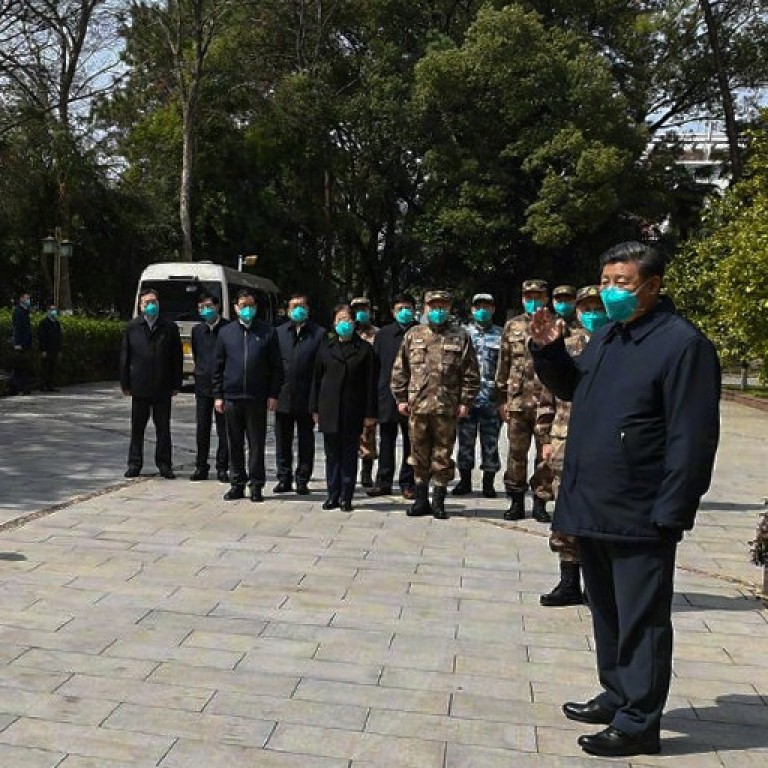
Chinese President Xi Jinping salutes Wuhan under shadow of coronavirus pandemic threat
- Xi lauds frontline workers and residents at the outbreak’s epicentre to boost morale and support for the Communist Party
- Trip also an attempt to send a message to the world about ‘the strength of China’s political system’
The much-anticipated visit – about three months after first cases were reported in the provincial capital of Hubei province – was carefully orchestrated to boost domestic morale and seize back the narrative.
Having come under heavy criticism from overseas initially, Beijing is now portraying its containment efforts as a heroic fight showcasing the Chinese people’s spirit as well as the strength of the country’s unique political system.
By making the symbolic visit, Xi sent a message to the world that the extreme measures undertaken by his authoritarian government were “highly effective”, said Shi Yinhong, a professor of international relations at Renmin University and a government adviser.
“It also tells developing countries that China’s experience, if not its governance model, is worth learning or using as a reference,” Shi said.
“The message to the domestic audience is that the rampant epidemic has now be brought under control and this is possible [only] under the leadership of Xi,” he said. “The Communist Party wants to highlight the decisive role Xi has played in this.”
Xi flew to Wuhan, in central China, on Tuesday morning. Accompanied by his trusted ideology tsar Wang Huning, the president inspected a special hospital that was built in just 10 days and toured local communities. He waved to residents in lockdown and thanked the city’s people for their “selfless sacrifice and contribution” in containing the deadly disease.
Xi also praised the efforts of medical workers, soldiers, police, frontline officials and volunteers, state media reported.
Short of declaring mission accomplished, Xi said victory was in sight and asked the public to rally behind the government to see through “the last mile”. He also said it was time for businesses and factories to go back to normal and for the country to refocus on economic growth.
The daily tally of new infections in China dropped to only 19 on Tuesday. More than 60,000 patients – about 74 per cent of the total – have been treated and discharged from hospital.
Meanwhile, the pace of the deadly outbreak picked up in other parts of the world.
On Monday, World Health Organisation director general Tedros Adhanom Ghebreyesus said the threat of a global pandemic had become “very real”. The coronavirus – which causes a disease called Covid-19 – has so far infected 113,642 around the world and spread to all continents except Antarctica.
China, where the outbreak was first reported, took drastic measures, including restricting millions of people’s freedom of movement and putting in place strict quarantine measures for all suspected cases. It quickly mobilised resources across the country to fend off the spread.
Xi reminded the public that he was the architect of these measures and he took command “in person” from the outset.
Gu Su, a political scientist at Nanjing University, said Xi had been under pressure to go to Wuhan for quite some time.
“He’s under enormous pressure to make the trip, particularly because he claimed to be personally in charge of disease control from the onset of the outbreak,” Gu said.
“It would have been too late if he had chosen not to take the trip. The situation in Wuhan has improved markedly and we are seeing a turning point in the outbreak.”
Gu said that by making the trip, Xi strengthened his position and also attempted to placate public grievances.
Many people voiced their anger in China’s heavily censored cyberspace over the death of doctor Li Wenliang, who raised a cautious alarm of the virus only to be muffled by the local authorities.
Hundreds of thousands vented their anger online, forcing an embarrassing about-face from the government.
Gu said the time was not right to declare a victory, given the threat of a pandemic.
China is facing a rising number of imported cases and many specialists say the country could still be hit by another wave if the disease continues to spread around the world unchecked.
Beijing is clearly aware of the challenges ahead. While it starts to relax some of the draconian travel restrictions, it continues to urge the public to avoid crowd gatherings when celebrating the Ching Ming grave-sweeping festival next month.
Xie Maosong, a professor at the University of the Chinese Academy of Sciences, said Xi’s visit would also come as a warning to local cadres “not to be complacent when the final win is near”.
“The final part of the endeavour is the hardest to finish,” Xie said. “Beijing needs to make sure the epicentre is completely clean, before the thousands of medical staff and mountains of medical supplies poured into Wuhan and Hubei province can be redeployed to better cope with the challenge in the next stage – containing the imported cases.”
Also, there are still a lot of uncertainties over China’s economy, which has been hit hard by the outbreak, and the balance of resuming work and disease control will be difficult, according to analysts.
Additional reporting by William Zheng
Purchase the China AI Report 2020 brought to you by SCMP Research and enjoy a 20% discount (original price US$400). This 60-page all new intelligence report gives you first-hand insights and analysis into the latest industry developments and intelligence about China AI. Get exclusive access to our webinars for continuous learning, and interact with China AI executives in live Q&A. Offer valid until 31 March 2020.



